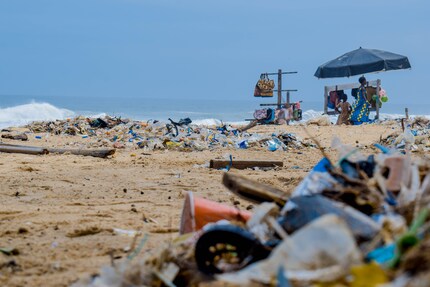
Background information
People should be able to see that you do sport, but not smell it
by Siri Schubert

During Black Friday, I had a guilty conscience when I saw thousands of plastic bags being distributed in our shops. They're said to be harmful to the environment and should be banned. But is this really the case?
Public opinion is that plastic is harmful to the environment because it takes a long time to biodegrade. The EU therefore wants to ban plates, straws and other single-use plastics by 2021. Plastics account for 80% of the waste in the oceans. The EU wants to combat pollution by banning them. Switzerland is taking a different stance. "And rightly so," says Rainer Bunge, Professor of Environmental Technology at Rapperswil University of Applied Sciences and a specialist in recycling and waste. "Bans are not the right way forward in Switzerland. Our waste management system works better than in most other countries," he continues, "even though a large proportion of plastic is not recycled, but incinerated."
Isn't that a contradiction? "No," says Rainer Bunge. "The household waste incineration plant feeds the district heating network, which in turn distributes heat to our homes. Without it, polluting oil-fired heaters would do the work. So a ban on plastic would at most prevent the uncontrolled disposal of this waste. Compared with other countries, this is a marginal phenomenon in Switzerland. "Here, a ban on plastic would be a declaration of bankruptcy for the waste management sector," explains Rainer Bunge.
"Germany sorts different types of plastic waste, but does not recycle them. The waste is exported to emerging countries, which recycle a small proportion of it and dump the rest in landfill sites or at sea," explains the recycling expert. Germany should follow the example of Switzerland, where waste is sorted less systematically, but incinerated to the most modern standards in the field.
In addition, what is needed is to use less plastic on a daily basis. "Single-use plastic bags are totally absurd, so a ban is understandable," admits waste expert Rainer Bunge. But the repeated use of plastic bags results in a better carbon footprint than their hessian counterparts. Growing and processing plant raw materials generates more pollution than the production of plastic bags themselves. Paper falls somewhere in between.

Plastic's bad reputation can be attributed first and foremost to the vast quantities of plastic waste in the oceans. According to the WWF, 86 million tonnes of plastic float in the sea. Every minute, the equivalent of an entire rubbish truck of plastic is dumped into the sea. The main causes of this disaster are the countries of South-East Asia, which have no orderly waste disposal system. The waste ends up in landfill sites or in the sea. According to Rainer Bunge, a ban on plastic would therefore be appropriate in these countries. Ecological and biodegradable solutions replacing plastic are most useful where it is not incinerated, but ends up in landfill.
This ban is working, as shown by the example of Rwanda, a landlocked East African country that banned plastic bags more than ten years ago, making it, incidentally, a pioneer in the field. The state-imposed environmental awareness campaign seems to be working. In the streets of Kigali, the capital, there is almost no rubbish, and shopping is done in paper bags. Two years ago, Kenya followed suit. Recalcitrant shoppers and offenders risk heavy fines and prison sentences.
Switzerland doesn't need to go that far insofar as plastic isn't as big a problem as it is over there. So you can put your purchases in a plastic bag without a guilty conscience, as long as you use it several times afterwards.
When I flew the family nest over 15 years ago, I suddenly had to cook for myself. But it wasn’t long until this necessity became a virtue. Today, rattling those pots and pans is a fundamental part of my life. I’m a true foodie and devour everything from junk food to star-awarded cuisine. Literally. I eat way too fast.
Interesting facts about products, behind-the-scenes looks at manufacturers and deep-dives on interesting people.
Show all